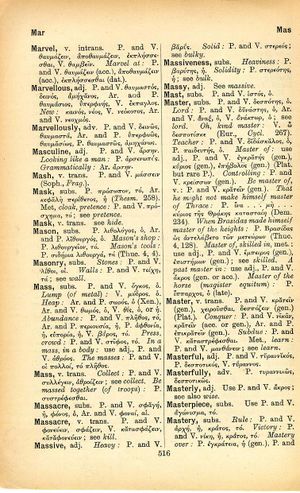master
ἀρκετὸν τῇ ἡμέρᾳ ἡ κακία αὐτῆς → sufficient unto the day is the evil thereof, each day has enough trouble of its own, there is no need to add to the troubles each day brings (Matthew 6:34)
English > Greek (Woodhouse)
substantive
lord: P. and V. δυνάστης, ὁ, Ar. and V. ἄναξ, ὁ, V. ἀνάκτωρ, ὁ; see lord.
oh, kind master: V. ὦ δεσποτίσκε (Eur., Cyclops 267).
teacher: P. and V. διδάσκαλος, ὁ, P. παιδευτής, ὁ.
master of: use adj., P. and V. ἐγκρατής (gen.), κύριος (gen.), ἐπήβολος (gen.) (Plato but rare P.).
controlling: P. and V. κρείσσων (gen.).
be master of, v.: P. and V. κρατεῖν (gen.).
that he might not make himself master of Thrace: P. ἵνα… μὴ… κύριος τῆς Θρᾴκης κατασταίη (Dem. 234).
when Brasidas made himself master of the heights: P. Βρασίδας ὡς ἀντελάβετο τῶν μετεώρων (Thuc. 4. 128).
master of, skilled in. Met.: use adj., P. and V. ἔμπειρος (gen.), ἐπιστήμων (gen.); see skilled.
a past master in: use adj., P. and V. ἄκρος (gen. or acc.).
master of the horse (magister equitum): P. ἵππαρχος, ὁ (late).
verb transitive
P. and V. κρατεῖν (gen.), χειροῦσθαι, δεσπόζειν (gen.) (Plato).
conquer: P. and V. νικᾶν, κρατεῖν (acc. or gen.), Ar. and P. ἐπικρατεῖν (gen.).
subdue: P. and V. καταστρέφεσθαι.

